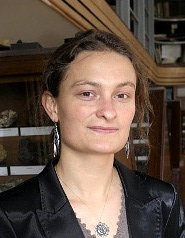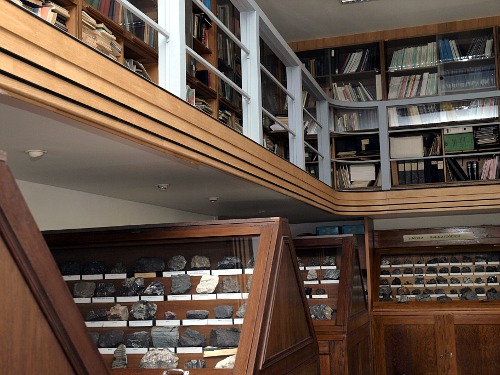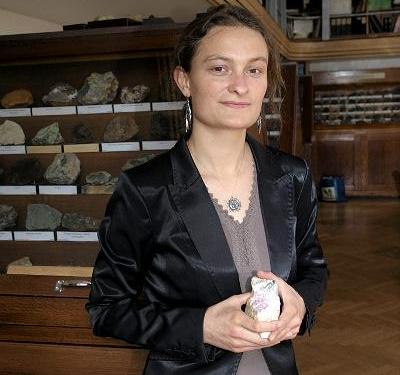“And how will I recognize you?” I asked Kateřina Schlöglová, a geology student at the Charles University Faculty of Science and the main organizer of the Mineral Resources for the Society conference that I was planning to visit. “You definitely won’t miss a female geologist in high heels. They look kind of out of place and dainty compared to her usual footwear – hiking boots.”
|
Kateřina Schlöglová, a fifth year student at the Institute of Petrology and Structural Geology of the Charles University Faculty of Science |
A conference of young deposit geologists could be a good opportunity to discover talented students and future experts. How does one tell a talented geologist and what qualities do they need to have? Such a person needs to be inquisitive, a good observer and passionate scientist. From my point of view of a fifth-year student I must say that geology is a specialization for those who are able and willing to devote time to it and who are not afraid to show their love of nature. It is not a subject one can study only to obtain a degree. Not only would they not enjoy it but they would not be motivated to finish the studies because of the demanding courses of mathematics, chemistry and other specialized subjects that one must pass. A good geologist is one who is capable of independent scientific work after years of studying – in the lab or out in the field, depending on the subject he or she is dealing with. A good student should be able to seek valuable information in a flood of data and they should be able to combine and interpret those findings. Studying geology is all about enthusiasm, courage and not being afraid to get out in the field, put on your hiking boots, grab a hammer or a magnifying glass and look at things right there in nature. It shouldn’t be just about reading and looking at pictures in books. The main goal of the Mineral Resources for the Society student conference was to address proactive students interested in deposit geology and related fields, to encourage them to present the outcomes of their work and use the opportunity to move ahead in their research and education through discussions with experts and colleagues in the field. Last but not least such a meeting helps to establish contacts with foreign colleagues. Cooperation between student groups facilitates student exchanges and participation in workshops and seminars organized by foreign universities.
|
Modern civilisation depends on scientific research. Do you think we can still discover some unknown qualities and properties of ores and minerals that could compete with synthetically produced elements and materials with predetermined properties?
It depends on the materials in question. The technology of synthesis of certain minerals was used already during WWII and since then we have moved forward by leaps and bounds. Despite the massive use of synthetic analogues, natural stones, e.g. diamonds, cannot be fully replaced. Just like with many other metals, society has lately focused on platinum metals, for example, whose price continues to rise. There are several important platinum metal deposits in the world and others are going to be discovered with the development of exploration and extraction methods. This topic is frequently discussed even by our colleagues in this country. Materials sciences concentrating on the possibilities of utilizing natural and synthetic phases and studying their properties will have a lot to say in the field of mineral resources.
So mineralogy has not said its last word then?
Mineralogy has definitely not said its last word. As for Europe, for example in Finland and Sweden, in the area of the Fennoscandian Shield, a large number of gold, copper and iron deposits as well as deposits of platinum metals, rare earths and other metals are being explored, besides the many deposits already being extracted in the region. Scandinavia and the Balkans are currently the most active regions in Europe but it is mainly Canada, Brazil, Australia, South Africa, the Middle East, Russia and China that are the most influential globally, as regards mineral resources.
You’ve mentioned diamonds. How about gold? Would I have a chance as a prospector here in the Czech lands?
Gold? Definitely a metal impossible to ignore in this country. There are many locations in the Bohemian Massif where it can be found. Someone without a scientific interest is most likely to find gold by panning; there are even a number of panning competitions. You can give it a try near Jílové u Prahy, in Kašperské Hory, Zlaté Hory or the Písek area – the sediments of the Otava River will yield many a gold nugget if you are patient enough.
Thank you for talking to iForum.
More on the Mineral Resources for the Society conference
|
The collections at the Institute of Petrology and Structural Geology |
An elbaite tourmaline from Nová Ves, a favourite stone of Kateřina Schlöglová, a fifth-year student at the Institute of Petrology and Structural Geology of the Charles University Faculty of Science and President of the SGA Student Chapter Prague |
(Marie Kohoutová)
Translation: Pavla Horáková


